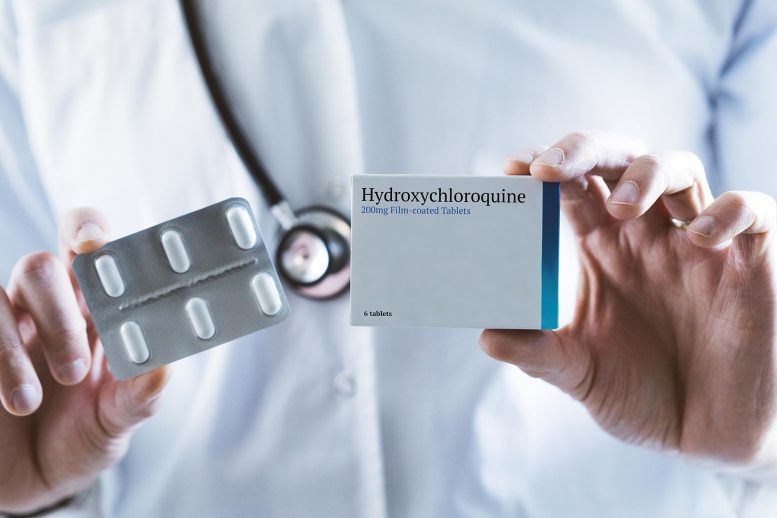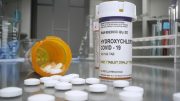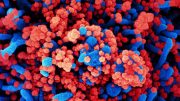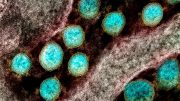
An observational multi-center study shows that the risk of death is 30% lower for coronavirus patients treated with hydroxychloroquine.
Hydroxychloroquine Reduces In-Hospital COVID-19 Mortality
An observational multi-center study, coordinated by the I.R.C.C.S. Neuromed, with the participation of 33 Italian hospitals, shows that the risk of death is 30% lower for coronavirus patients treated with hydroxychloroquine.
An Italian observational study contributes to the ongoing debate regarding the use of hydroxychloroquine in the current pandemic. The research, conducted on 3,451 patients treated in 33 hospitals throughout the Italian territory (list of participating centers attached), shows that the use of this drug reduces by 30% the risk of death in hospitalized patients affected by Covid-19.
Published in the European Journal of Internal Medicine, the study was coordinated by the Department of Epidemiology and Prevention of the I.R.C.C.S. Neuromed, Pozzilli, in collaboration with Mediterranea Cardiocentro, Naples, and the University of Pisa, with the participation of 33 hospitals forming the CORIST collaboration (COvid-19 RISk and Treatments). Researchers analyzed data regarding current and previous diseases, therapies followed before the infection, and drugs administered in the hospital specifically for the treatment of COVID-19. All this information was compared with the evolution and the final in-hospital outcome of the infection.
“We observed — explains Augusto Di Castelnuovo, epidemiologist at the Neuromed Department of Epidemiology and Prevention, currently at Mediterranea Cardiocentro in Naples — that patients treated with hydroxychloroquine had a 30% lower in-hospital mortality rate compared to those not receiving this treatment. Our data were subjected to extremely rigorous statistical analysis, taking into account all the variables and possible confounding factors that could come into play. The drug efficacy was evaluated in various subgroups of patients. The positive results of hydroxychloroquine treatment remained unchanged, especially in those patients showing a more evident inflammatory state at the moment of admission to hospital.”
“While waiting for a vaccine — says Licia Iacoviello, Director of the Department of Epidemiology and Prevention at Neuromed and professor of Public Health at the University of Insubria at Varese — identifying effective therapies against COVID-19 is an absolute priority. We hope that our research will make an important contribution to the international debate on the role of hydroxychloroquine in the treatment of hospitalized patients with coronavirus. Further observational studies and ongoing clinical trials will of course be needed to better assess the role of this drug and the most appropriate administration methods. However, data from the CORIST collaboration support the use of hydroxychloroquine. At variance with some studies carried out in other countries, where the efficacy of the drug was not observed, it is interesting to note that the doses of hydroxychloroquine adopted in Italy (200 mg, twice a day) are lower than the ones used in those researches.”
“In past months — comments Giovanni de Gaetano, President of Neuromed — the World Health Organization recommended a stop to the use of hydroxychloroquine on the basis of an international observational study, subsequently retracted. Now the new data from the CORIST study, resulting from a ‘real life’ national collaboration, might help Health Authorities better clarify the role of this drug in the treatment of COVID-19 patients.”
Reference: “Use of hydroxychloroquine in hospitalised COVID-19 patients is associated with reduced mortality: Findings from the observational multicentre Italian CORIST study” by Augusto Di Castelnuovo, Simona Costanzo, Andrea Antinori, Nausicaa Berselli, Lorenzo Blandi, Raffaele Bruno, Roberto Cauda, Giovanni Guaraldi, Lorenzo Menicanti, Ilaria My, Giustino Parruti, Giuseppe Patti, Stefano Perlini, Francesca Santilli, Carlo Signorelli, Enrico Spinoni, Giulio G. Stefanini, Alessandra Vergori, Walter Ageno, Antonella Agodi, Luca Aiello, Piergiuseppe Agostoni, Samir Al Moghazi, Marinella Astuto, Filippo Aucella, Greta Barbieri, Alessandro Bartoloni, Marialaura Bonaccio, Paolo Bonfanti, Francesco Cacciatore, Lucia Caiano, Francesco Cannata, Laura Carrozzi, Antonio Cascio, Arturo Ciccullo, Antonella Cingolani, Francesco Cipollone Claudia Colomba, Francesca Crosta, Chiara Dal Pra, Gian Battista Danzi, Damiano D’Ardes, Katleen de Gaetano Donati, Paola Del Giacomo, Francesco Di Gennaro, Giuseppe Di Tano, Giampiero D’Offizi, Tommaso Filippini, Francesco Maria Fusco Ivan Gentile, Alessandro Gialluisi, Giancarlo Gini, Elvira Grandone, Leonardo Grisafi, Gabriella Guarnieri, Silvia Lamonica, Francesco Landi, Armando Leone, Gloria Maccagni, Sandro Maccarella, Andrea Madaro, Massimo Mapelli, Riccardo Maragna, Lorenzo Marra, Giulio Maresca Claudia Marotta,, Franco Mastroianni, Maria Mazzitelli Alessandro Mengozzi, Francesco Menichetti, Marianna Meschiari, Filippo Minutolo, Arturo Montineri, Roberta Mussinelli, Cristina Mussini, Maria Musso, Anna Odone, Marco Olivieri, Emanuela Pasi Francesco Petri, Biagio Pinchera, Carlo A. Pivato, Venerino Poletti, Claudia Ravaglia, Massimo Rinaldi, Andrea Rognoni, Marco Rossato, Ilaria Rossi, Marianna Rossi Anna Sabena, Francesco Salinaro, Vincenzo Sangiovanni, Carlo Sanrocco, Laura Scorzolini, Raffaella Sgariglia, Paola Giustina Simeone, Michele Spinicci, Enrico Maria Trecarichi, Amedeo Venezia, Giovanni Veronesi, Roberto Vettor, Andrea Vianello, Marco Vinceti Laura Vocciante, Raffaele De Caterina, Licia Iacoviello and The COVID-19 RISK and Treatments (CORIST) Collaboration, 25 August 2020, European Journal of Internal Medicine.
DOI: 10.1016/j.ejim.2020.08.019
The CORIST Collaboration
CORIST (COvid-19 RISk and Treatments) is a collaboration between 33 Italian clinical centers devoted to the collection and study of data relating to COVID-19 patients. It is a study carried out in the “real life” of Italian National Health System, bringing together the different experiences of large and small clinical centers, from Lombardy to Sicily.
The I.R.C.C.S. Neuromed
The Institute for Research, Hospitalization and Health Care (I.R.C.C.S.) Neuromed in Pozzilli (Italy) is a landmark, at Italian and international level, for research and therapy in the field of neurological and cardiovascular diseases. A centre in which doctors, researchers, staff, and the patients themselves form an alliance aimed at ensuring the best level of service and cutting-edge treatments, guided by the most advanced scientific developments.








Some doctors reporting that Hydroychloroquine MUST BE administered with ZINC!! (& arethromycin) – otherwise it doesn’t work for covid. Up to 100% effective if started early.
Actually, only one doctor is pushing that. And no, it is not 100% effective in any case. E.G. the French study claiming 100% recovery stated in the paper that patients who became too ill to continue taking HC or were transferred to ICU were *removed from the study*, rather than counted.
Hahahahaha sure it does
Melatonin also limits the effect of the Cytokine Storm and the intense inflammation that goes with it, with less harsh side effects than hydroxychloroquine. Lung inflammation is one of the main causes of death with covid-19, and melatonin is an anti-inflammatory. The horseshoe bat, that carries a corona virus 96% genetically identical to SARS-COV-2, also has a very high level of Melatonin in it’s body, which is the suspected reason why the bat does not succumb to the virus even though it acts as it’s host.
We all know it’s effective, even scientists, they just follow protocols for the most part. Once wrong information is out, they will conduct their experiments on previous information… That is one of the susceptibilities of science, besides politics involvement, corrupt funding, difference between real world and data…
Odd. Multiple studies have shown the opposite, including recent double blind studies. Additionally, data from people already taking the drug for things like lupus showed no benefit from taking the drug.
I’m suspecting bad science here.
Links to the ‘multiple’ other studies? What dosage were they using in comparison to the Italian studies? I suspect you’re not a scientist at all, and are making a political statement, as most idiots do these days.
Just look in the box ‘More on SciTechDaily’ above these comments. On my page it links to at least two other studies showing no benefits.
And yes, I *am* a scientist, and *you* are trying to judge medical science by your politics, making you a member of the last category you mention.
You have been duped. Most of the studies that you’ve read about were improperly structured for various reasons. The vast majority of hospitals and doctors are fully aware that this drug works and works well. Thankfully, they have continued to prescribe this treatment in the face of a misinformation war from the media and the left who were simply reacting to Trump’s hopeful endorsement of this treatment. It is ridiculous, I know, but that is the world we live in today.
No, the double-blind studies were properly designed and run. But they can only provide evidence for or against the designed protocol (dosage, initial patient condition, etc.) The trouble with the Observational Studies is that there IS no protocol. Thus the heavy use of statistics to try and iron out the wrinkles.
Still, the high number of patients in this study indicate that HC *can* help if given properly. Now we need to find out why we have contradictory results from various studies.
And no, none of these results will “prove Trump right” simply because he was wrong to call for its use without proper study, wrong to ignore the caution of his chief epidemiologist Dr. Fauci, and wrong to latch onto the first treatment he heard of simply because he badly needed a miracle cure to save his job.
Hydroychloroquine MUST BE administered with CYANIDE!!! For sure you wont die on Covid 19.
See, I heard this had alien DNA in it, because I heard we need the version with alien DNA. People are also saying Bleach can provide an instant cure in 90 secs if swallowed. I heard it from a very important man, who tells me its safe…. So, certainly it must be…
So is Trump trying to sell melatonin too now?
This scares me because it can only mean a short list of things:
1) US doctors are either incompetent
2) Or are expert at fudging numbers and studies and,
3) They do so in a coordinated manner indicating a central authority is directing their doctoring of results
Can’t help but notice that your ‘short list’ is missing all the possible non-conspiratorial reasons why different studies can have conflicting results.
Just follow the money to learn why so many studies are being shut down early.
I’m no great fan of Trump but I am a retired scientist who finds it deplorable that TDS became the determining factor for HCQ efficacy in treatment of Covid-19 as reported by Media.
Reading worldwide scientific research and medical journals early on it was clear that nearly half of physicians around the world used HCQ to some benefit. Soon it became clear the benefit was significant
One thing never in doubt, HCQ was a perfectly safe drug that’d been used by billions of patients for several decades
Then Trump mentioned HCQ casually one day, trying to give folks some hope. I thought nothing of it since it was clear that Trump hadn’t pulled it out of some wacky source, it was rapidly becoming standard of care around the world
But suddenly HCQ was a dangerous drug and Trump was trying to kill people!
No those afflicted with TDS were killing people. The insanity spread even into formerly respected science and medical journals. HCQ use was prohibited in several states, which almost certainly resulted in the deaths of thousands
In my view the data was obvious at least on the level of informed intuition
The studies that showed no benefit were flawed and the tens of thousands of clinical reports were ignored
The drug HCQ has to be started within the first few days of the onset of symptoms. This is consistent with most antiviral drug therapies
When anyone pretending to know what they’re talking about said “there’s no data and no RCTs, I thought WTH are you thinking? 45% of Covid-19 patients worldwide are being treated with HCQ. If you arent able to get a helluva good idea of how it works from that data then find another job! If they said HCQ is very dangerous, well something was very wrong and I ignored them
Now Harvey Risch at Yale finally said enough! and is causing quite a ruckus. Good
One other factor related to the death of journalism, faux-journalists were busy looking for the profit Trump’s making from the generic HCQ but didn’t bother with big pharma and the billions they’d lose if HCQ really did work at $20 per patient treatment vs $2500 for remdisevir from Gilead sciences
Just my two cents worth
Jim